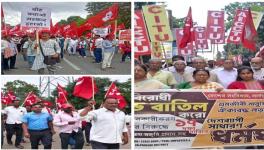EPFO Fund Transfer Under Finance Act Unlikely; Trade Unions Demand Bihar Model for Contractual Workers
Kolkata: Two recent developments related to the Employees Provident Fund Organisation (EPFO) have created a stir and the central trade unions are involved in both, though in different capacities. The first development relates to an agenda item for the meeting on March 12 of EPFO’s Central Board of Trustees (CBT). The agenda was for the transfer of Rs 100 crore from ‘unclaimed’ funds in the custody of the organisation to the Senior Citizens’ Welfare Fund under the Union Ministry of Social Justice and Empowerment. The second development is the demand of central trade unions placed before the Union Labour & Employment Minister Bhupendra Yadav to bring all contractual workers under the EPFO umbrella. In support of this demand, trade unions have cited the initiative already taken by the Bihar government and urged the labour minister to see that the Bihar model is adopted by all the state governments.
The agenda item for transfer of Rs 100 crore was not ultimately taken up as discussions on the official proposal for reduction of interest rate for 2021-22 to 8.1% (from 8.5%) consumed much of the time. Trustees representing the trade unions vehemently protested the rate cut. But the trade unions have conveyed their reservation to the minister about the proposed transfer of Rs 100 crore, citing several concerns.
While explaining the reasons for concerns, Bharatiya Mazdoor Sangh president and trustee, Hiranmay Pandya told NewsClick that trade unions were against terming the amount as ‘unclaimed’; they would rather call it ‘unsettled’. As such, they were not against transferring the Rs 100 crore, but “whose money would be transferred and what would happen if some account holders or their legal heir lodged claims with supporting documents? Moreover, does the Employees Provident and Miscellaneous Provisions Act 1952 allow a transfer?
Although the provision for transfer was made in the Finance Act 2015, this is for the first time that a transfer proposal found place on the CBT meeting agenda. Pandya hinted they may get the matter examined by their legal advisors.
Asked about the legality of the transfer provision in the Finance Act 2015, a senior EPFO official explained to NewsClick that the Senior Citizens Welfare Fund was envisaged as a pool and even if there is no provision in the EPF Act of 1952 for such transfer of funds held by EPFO, the Parliament can always authorise such transfer, if necessary, by amendments. So, that cannot be a big hurdle, according to the official.
Keeping in view the trade unions’ reservation, a strenuous exercise would have to be undertaken to identify persons whose funds would comprise the transferred amount; it would also entail how claims, if lodged subsequent to the transfer, would be handled. In this regard, the labour ministry would find legal ways to be freed of the obligation under the Finance Act 2015. Once this issue is sorted out, a part of the contentious funds can be utilised to provide relief to existing EPFO members.
In the representation to Union labour minister, the United Trades Union Congress (UTUC – an arm of the Revolutionary Socialist Party) demanded, with the backing of other trade unions, that poorly paid contractual workers be brought under the purview of EPFO as a much needed social security measure. The representation followed after UTUC broached the matter with the Union minister. The central trade unions observed that today, far from being a model employer, the government itself is regularly engaging contractual and outsourced workers in large numbers and social security cover for them does not find a place in the government’s scheme of things. The BMS has also made a similar demand.
Interestingly, in the representation sent to Yadav, UTUC general secretary Ashok Ghosh has cited the example of Bihar where the state government over the last couple of years has extended PF cover to contractual workers engaged as home guards, in prisons, ASHA and Anganwadi units, in education (including para teachers) and health care. Extension of the benefit has increased the number of workers who were provided the social security net from three lakh plus to over seven lakh. Chief minister Nitish Kumar has shown that this is doable and this model can be replicated by other state governments, the representation contended.
Explaining the ground realities of the past several years, Ghosh told NewsClick that state governments and their agencies had been increasingly engaging contractual workers for jobs for which regular workers were recruited earlier, and thereby, got statutory benefits including the most important one -- PF. If the Bihar model is followed by other state governments, over a crore of additional workers will come under the umbrella of EPFO, which today manages funds in excess of Rs 12 lakh crore. As EPFO members, their jobs will be “formalised” in all respects. The process should start with the setting up of task forces mandated to identify contractual workers engaged by state governments and their agencies.
The union representation also called for expediting long pending reforms in this sphere. It cited the Employees State Insurance Scheme (ESI) and pointed out that in respect of eligibility, the EPFO Act is restrictive while the coverage under the ESI scheme is wider. Under ESI, which has contributions both from employers and employees, all non-seasonal factories having 10 or more employees are covered. The monthly salary should not exceed Rs 21,000 for general employees and Rs 25,000 for people with disability. But, under EPFO, the limit for deducting contribution from both employees and employers has been set at Rs 15,000 and only establishments with 20 or more employees come under its purview. Thus, a large numbers of employees are automatically left out of the social security cover. Keeping this discrimination in view, UTUC has demanded that the ESI provision both in respect of salary limit and coverage be extended to EPF.
UTUC has also drawn the Union labour ministry’s attention to GSR 226 (E), dated March 26, 2015, which had amended paragraph 9 of Employees Pension Scheme 1995 and substituted ‘actual service’ with ‘contributory service’. As a result, benefits available to employees earlier were reduced. Previously, a member who had rendered actual service of 11 years with two years of non-contributory period was entitled to pension as his service duration was taken as 11 years. The quantum of pension was arrived at taking ‘09 years’ contribution’. But, after the notification of March 26, 2015 took effect, “members with any spell of non-contributory period” were ruled out for pension. The contributory service concept has deprived thousands of eligible employees from getting legitimate benefits under the Employee Pension Scheme ‘95, it has been argued.
Ghosh alleged that still there are many establishments throughout the country that are not providing PF benefits to their employees. The enforcement wing of EPFO should be strengthened to check this malpractice and proceed against defaulters.
For the record : Origin of Senior Citizens’ Welfare Fund
The proposal was introduced in the Union Budget for 2015-16 by the then finance minister Late Arun Jaitley and rules framed therefore were notified by the Centre in GSR 322 (E) dated March 18, 2016 on the strength of Sec 128 of Finance Act, 2015 / 20 of 2015. It was intended to be a pool created by transferring ‘unclaimed’ funds lying with / under a host of schemes of PPF, EPFO, and post offices.
The Act provided for transferring specified quantum of funds before March 1 every year and stipulated that before the transfer, efforts should be made to contact each of the account holders of unclaimed funds twice within a period of 60 days. The Union Ministry of Social Justice and Empowerment was the designated authority for administering the fund, which was to be utilised for financial security of senior citizens, healthcare, health insurance and general welfare of elderly citizens. The schemes were to include old-age houses, day care of senior citizens and ‘research related with ageing’.
It does not appear to be an active provision. It is seen from the demands for grants, 2022-23, of the department of social justice and empowerment (demand no. 93), the actual spend (item 22 / 22.01) was Rs 26.5 crore for 2020-21. No allocations were made for subsequent years, including 2022-23, and the appended notes do not throw any light.
Get the latest reports & analysis with people's perspective on Protests, movements & deep analytical videos, discussions of the current affairs in your Telegram app. Subscribe to NewsClick's Telegram channel & get Real-Time updates on stories, as they get published on our website.























